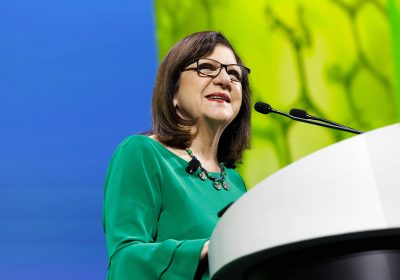Responding to COVID-19, and a Call to Eliminate Cancer Health Disparities
In 2020, COVID-19 dominated the news and changed our personal and professional lives. Workplaces, schools, and gathering places like restaurants and public parks were closed or offered restricted access. The American Association for Cancer Research (AACR) has not been immune to the impact of the pandemic. The AACR Annual Meeting, scheduled for April in San Diego, was quickly adapted into two groundbreaking Virtual Annual Meetings, with more than 100,000 registered attendees from 127 countries around the world for both meetings combined.
To rapidly respond to ongoing COVID-19 challenges, AACR president Antoni Ribas, MD, PhD, formed an AACR COVID-19 and Cancer Task Force that includes experts from all the disciplines relevant to this disease and its impact on cancer. One of the first actions spearheaded by the Task Force was the organization of an AACR Virtual Meeting dedicated to COVID-19 and Cancer and the related scientific and policy advances. This exceptional conference, held in July, focused on the rapidly emerging data in basic, clinical, and epidemiological research related to COVID-19 and cancer. A second AACR Virtual Meeting on this important topic will be held Feb. 3-5, 2021.
The COVID-19 pandemic has laid bare the stark health inequities experienced by racial and ethnic minority populations in the United States, but these inequities are not confined to the coronavirus. Racial and ethnic minority populations are also among the groups experiencing cancer health disparities—differences in the distribution of the cancer burden across various population groups. These differences are less pronounced now than in the past, but they persist in African American, Hispanic, Asian, Native Hawaiian or other Pacific Islander, and American Indian/Alaskan Native populations. Other factors leading to cancer health disparities include education and income, access to health care, and geographic location.
In September, the AACR released the inaugural AACR Cancer Disparities Progress Report 2020: Achieving the Bold Vision of Health Equity for Racial and Ethnic Minorities and Other Underserved Populations. With the publication of this landmark report, the AACR seeks to increase public understanding of cancer health disparities and the key role that research plays in reducing these differences. The report underscores the need for increased annual funding for federal government entities that fuel progress against cancer health disparities, including the National Institutes of Health, the National Cancer Institute, and the Centers for Disease Control and Prevention. The AACR also calls for greater participation of racial and ethnic minority patients in cancer clinical trials, so study participants more accurately reflect cancer patients at large.
Greater diversity among cancer researchers is also an AACR priority. This year the AACR is celebrating the 20th anniversary of Minorities in Cancer Research (MICR), a group of more than 5,000 AACR members leading the way in increasing diversity in cancer research and reducing cancer health disparities. MICR is recognized as a vital contributor to the AACR’s research and policy agendas. “Diversity is critical to the AACR’s success,” said John D. Carpten, PhD, MICR chair. “That’s seen in the programs it has developed that inspire young researchers, because they see that there is a place for people like them and that they can pursue this career.”
In September, MICR and the AACR issued a Call to Action denouncing racism and racial inequities in society and in cancer research and medicine. Among the action items were calls to promote policies that guarantee equitable access to quality health care; advance the education and training of early-career minority researchers; treat racism as a public health crisis similar to tobacco use or obesity; and advance the nominations of minority scientists and physicians to leadership positions in cancer science and medicine.
Greater racial, ethnic, gender, and geographic diversity among AACR members is a personal commitment of the AACR’s president. Dr. Ribas has also targeted the need to “improve health care for disadvantaged populations and reduce health inequities” as a goal of his presidency. Under his visionary leadership, the AACR is creating a Task Force to focus on racial inequities in cancer research and target racial injustices in biomedical research and health care. More broadly, Dr. Ribas has championed the use of data collected through basic and population science to benefit patients. “Data allow us to know what the issues are and how to address them scientifically,” he said.
Whether meeting the challenges posed by the coronavirus pandemic, condemning pervasive racism in our society, or challenging racial and ethnic disparities in cancer research and medicine, the AACR’s focus remains on cancer patients. An exemplar of this dedication to patients is the amazing Anna D. Barker, PhD, who has devoted her professional life to a better understanding of cancer. Much of her work has focused on translating vast amounts of data into advances that can benefit patients. “We have a lot of data, but that’s not necessarily information in the context of what a patient is. We are all an interconnected series of complex systems,” said Dr. Barker, who helped lead the design, initiation, and establishment of The Cancer Genome Atlas program while principal deputy director and deputy director of strategic scientific initiatives at the National Cancer Institute. “By bringing people from different disciplines together, we create knowledge networks that can transform data into information that can help us go from the molecular level to the patient.”
Bringing people together is a goal of the AACR Scientist↔Survivor Program (SSP), an initiative that Dr. Barker conceptualized more than two decades ago to build productive partnerships between scientists and advocates. These interactions positively change the lives of not only those affected by cancer, but also the lives of cancer scientists in their quest for more lifesaving discoveries. As Dr. Barker herself said, “For scientists, seeing the people impacted by this disease changes you. It gives you a sense of urgency and a desire to want to do more for patients.” Dr. Barker has been the SSP chair since the inception of this innovative program, and the AACR is deeply grateful to her for her vision and leadership.
 Margaret Foti, PhD, MD (hc)
Margaret Foti, PhD, MD (hc)
AACR Chief Executive Officer




